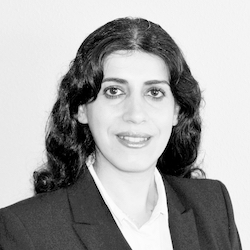Maryam Ravan

Title: Research Associate Professor
Department: Electrical and Computer Engineering
Campus: New York City
Area(s) of Expertise: Biomedical signal and image processing, wearable sensing systems, statistical analysis, machine learning, deep learning, microwave imaging and sensing, and nondestructive testing
Education Credentials: Ph.D.
Joined New York Tech: 2017
Maryam Ravan is a research associate professor in the Department of Electrical and Computer Engineering. Before joining New York Institute of Technology, she was a senior research scientist in the Department of Research and Development at LivaNova PLC, where her work focused on developing quantitative biomarkers and machine learning algorithms for investigating the efficacy of closed-loop Vagus nerve stimulation (VNS) therapy for epilepsy. She received a Ph.D. in electrical engineering from Amirkabir University of Technology (Tehran Polytechnic). She was a post-doctoral fellow with the University of Toronto and McMaster University, where she was involved in solving forward modeling and inverse problems and the related signal/image processing techniques for neural engineering, radar systems, microwave imaging, and non-destructive testing (NDT) applications. She also was a lecturer in the School of Computational Engineering and Science, McMaster University.
Ravan has authored or co-authored more than 100 journal and conference papers, a book chapter, and a book published by Wiley-IEEE Press. Her research interests include biomedical signal and image processing, wearable sensing systems, statistical analysis, machine learning, deep learning, microwave imaging and sensing, and nondestructive testing. Her research has been funded by several grants from the U.S. National Science Foundation (NSF), Hamilton Academic Health Sciences Organization (HAHSO), Canada's Natural Sciences and Engineering Research Council (NSERC), Canada's Mathematics of Information Technology and Complex Systems (MITACS), and New York Tech's Institutional Support for Research and Creativity (ISRC). She was selected for the U.S. Department of Energy's (DOE) Visiting Faculty Program at Brookhaven National Laboratory (BNL) for the summer 2024 term, and is a senior member of IEEE.
Selected Publications
- T. Vasei, H. Gediya, M. Ravan, A. Santhanakrishnan, D. Mayor, and T. Steffert, "Investigating Brain Responses to Transcutaneous Electroacupuncture Stimulation: A Deep Learning Approach," Algorithms, vol. 17, no. 477, Oct. 2024.
- M. Ravan, A. Noroozi, H. Gediya, K. J. Bascoc, and G. Haseyd, "Using deep learning and pretreatment EEG to predict response to Sertraline, Bupropion, and Placebo," Clinical Neurophysiology, vol. 167, no. 198–208, Sep. 2024.
- M. Ravan, A. Noroozi, M. M. Sanchez, L. Borden, N. Alam, P. Flor-Henry, S. Colic, A. Khodayari, L. Minuzzi, and G. Hasey, "Diagnostic deep learning algorithms that use resting EEG to distinguish major depressive disorder, bipolar disorder, and schizophrenia from each other and from healthy volunteers," Journal of Affective Disorder, vol. 346, pp. 285–298, Feb. 2024.
- R. K. Amineh, M. Ravan, and D. Tandel, "Detection of water pollutants with a nonuniform array of microwave sensors," IEEE Transactions on Instrumentation & Measurement, vol. 72, May 2023.
- A. Byberi, M. Ravan, and R. K. Amineh, "GloveSense: a hand gesture recognition system based on inductive sensing," IEEE Sensors Journal, vol. 23, no. 9, pp. 9210–9219, May 2023.
- T. Oakley, J. Coskuner, A. Cadwallader, M. Ravan, G. Hasey, "EEG biomarkers to predict response to sertraline and placebo treatment in major depressive disorder," IEEE Transactions on Biomedical Engineering, vol. 70, no. 3, pp. 909–19, March 2023.
- A. Noroozi, M. Ravan, B. Razavi. R. S. Fisher, Y. Law, and M. S. Hasan, "A robust eLORETA technique for localization of brain sources in the presence of forward model uncertainties," IEEE Transactions on Biomedical Engineering, vol. 70, no. 3, pp. 800–811, March 2023.
- M. Ravan, A. Noroozi, M. M. Sanchez, L. Bordena, N. Alam, P. Flor-Henry, and G. Hasey, "Discriminating between bipolar and major depressive disorder using a machine learning approach and resting EEG data," Clinical Neurophysiology, vol. 146, pp. 30–39, Feb. 2023.
Professional Honors and Awards
- Tahereh Vasei from our group received the Best Paper Award at IEEE SPMB, Fall 2024
- NSF Award, Award No. 2420783, 2024–2027
- Featured in New York Institute of Technology Magazine "Pushing the Boundaries With AI," Fall 2024
- Selected for the Department of Energy's (DOE) Visiting Faculty Program at Brookhaven National Laboratory, Summer 2024
- Featured guest on the "Ask the Experts" Clinical Neurophysiology podcast, March 2023
- New York Institute of Technology ISRC grant, 2023–2024
- Collaborative Research Agreement, McMaster University and New York Institute of Technology, HAHSO Award, 2022-2024
- New York Institute of Technology ISRC grant, 2022–2023
- Featured in LifeWire's AI & Everyday Life News "Brain Research Could Help Scientists Create New Kinds of AI—Here's How," Nov. 2022
- Featured in IEEE Spectrum for a study on "AI Can Offer Insight Into Who Responds to Antidepressants: A new algorithm predicts response to Sertraline with 83 percent accuracy," Oct. 2022
- Featured in New York Institute of Technology News "Engineering Solutions for Healthier Brains," Oct. 2022
- NSF Award, Award No. 1920098, 2019–2022
Courses Taught at New York Tech
- EENG 751 Signal Processing I
- EENG 125 Fundamentals of Digital Logic
- EENG 860 Special Topics (Machine Learning)
- EENG 670 Electromagnetic Theory
- EENG 484 Digital Communications
- EENG 491 Senior Design II
- EENG 489 Senior Design I